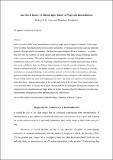Files in this item
Just out of reach: an ethnographic theory of magic and rationalisation
Item metadata
| dc.contributor.author | Irvine, Richard Denis Gerard | |
| dc.contributor.author | Kyriakides, Theodoros | |
| dc.date.accessioned | 2021-02-05T00:38:33Z | |
| dc.date.available | 2021-02-05T00:38:33Z | |
| dc.date.issued | 2019-02-05 | |
| dc.identifier | 257732860 | |
| dc.identifier | 2c294f2a-c50f-4d12-b05b-dd2cab11dc3e | |
| dc.identifier | 85061649578 | |
| dc.identifier.citation | Irvine , R D G & Kyriakides , T 2019 , ' Just out of reach: an ethnographic theory of magic and rationalisation ' , Implicit Religion , vol. 21 , no. 2 , pp. 202-222 . https://doi.org/10.1558/imre.37139 | en |
| dc.identifier.issn | 1463-9955 | |
| dc.identifier.other | ORCID: /0000-0003-0468-4510/work/90112673 | |
| dc.identifier.uri | https://hdl.handle.net/10023/21380 | |
| dc.description | This research has been supported by the grant “Magical thinking in contexts and situations of unbelief,” part of the Understanding Unbelief programme, funded by the John Templeton Foundation (JTF grant ID# 60624) and managed by the University of Kent. | en |
| dc.description.abstract | Perceived in their ideal forms, rationalisation and magic might seem to oppose one another. In this paper, however, rather than placing these forces in sterile opposition, we instead explore the social and relational dynamics through which rationalisation - the dominant epistemological force of modernity – in certain cases provides the conditions of doubt, opacity, and unknowability that makes magical thinking manifest in the everyday mundane. We explore such theoretical suggestions through ethnographic research conducted in Orkney and Cyprus. By examining connections between rationalisation and magic as these historically unfolded in these two different island settings, we initially provide a depiction of how the project of rationalisation led to the decline of magic in our two fieldsites. Then, by focusing on everyday manifestations of magical thinking, we nevertheless proceed to showcase how rationalisation and magic appear to sustain one other through an unresolved, generative tenson, emergent of the incapacity of the former to fully sublate the latter in its requirement to ‘know’ the world. The trajectory of rationalisation means that there is nothing unknowable in the world, and yet, from the position of any given person, there is no knowable whole. It remains out of reach. We conclude by discussing how the tensions inherent in the relation between rationalisation and magic allow for further theorising about the dimension of unknowing that permeates contemporary public epistemologies and subjectivities. | |
| dc.format.extent | 321866 | |
| dc.language.iso | eng | |
| dc.relation.ispartof | Implicit Religion | en |
| dc.subject | Magic | en |
| dc.subject | Rationalisation | en |
| dc.subject | Epistemology | en |
| dc.subject | Memory | en |
| dc.subject | Orkney | en |
| dc.subject | Cyprus | en |
| dc.subject | GN Anthropology | en |
| dc.subject | NDAS | en |
| dc.subject.lcc | GN | en |
| dc.title | Just out of reach: an ethnographic theory of magic and rationalisation | en |
| dc.type | Journal article | en |
| dc.contributor.institution | University of St Andrews. Social Anthropology | en |
| dc.identifier.doi | 10.1558/imre.37139 | |
| dc.description.status | Peer reviewed | en |
| dc.date.embargoedUntil | 2021-02-05 |
This item appears in the following Collection(s)
Items in the St Andrews Research Repository are protected by copyright, with all rights reserved, unless otherwise indicated.

